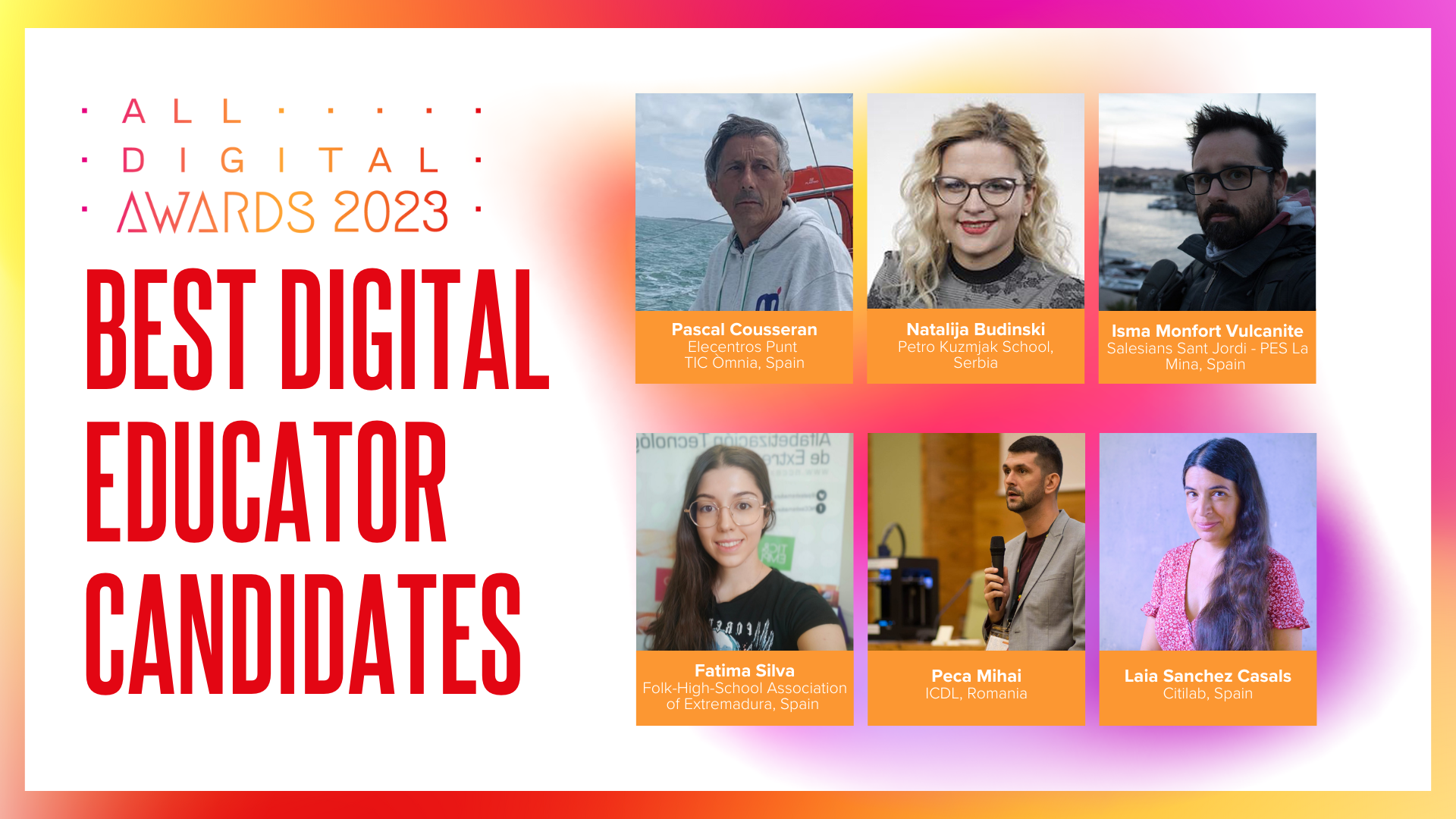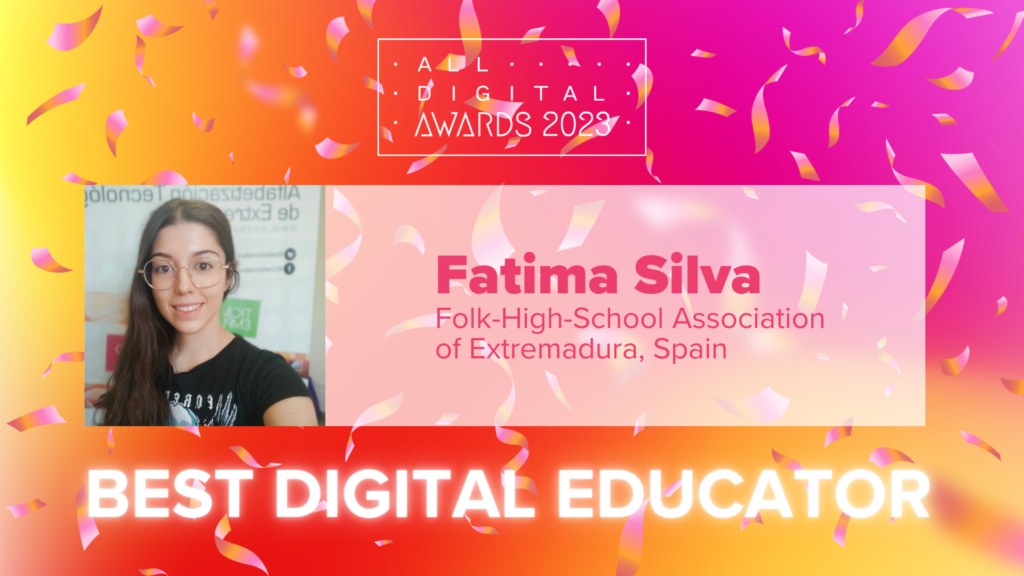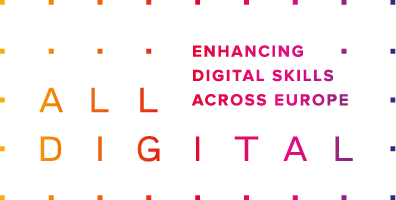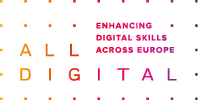
13 Jun ALL DIGITAL Awards 2023: Best Digital Educator
13 Jun, 2023
Winner Announcement
The winner for this category is Fatima Silva Parra! Congratulations!

Category: Individual
Nomination: by an individual or an organisation
Candidates:
Pascal Cousseran, Elecentros PunTIC Omnia, Spain
Pascal Cousseran an IT Social Center Responsive at PunTIC Omnia who leverages ICT to boost individuals’ self-confidence and success through technology experiences. He manages an IT center, providing comprehensive training and guidance, and fosters community integration through digital events. Pascal’s learner-centric approach tailors IT skill development to personal interests, encouraging multimedia creation and sharing on social platforms. His methods lead to increased tech confidence, empowerment, and self-esteem among trainees. Acting as a social educator and motivator, Pascal creates an inclusive IT environment for collaborative skill-building. His Connecta’t training aids unemployed individuals, boosting their self-esteem and job prospects through self-crafted materials and social campaigns.
Peca Mihai, ICDL, Romania
Mihai Peca is a trainer at ICDL Romania with a six-year track record in crafting, presenting, and imparting IT&C training programs. His focus extends to cutting-edge technologies, particularly 3D printing. Mihai employs a student-centered pedagogical approach, customizing methods like brainstorming, dynamic lectures, and real-case studies to cater to diverse learning needs. He’s an influential figure in both education and technology events, having conducted workshops in schools, public libraries, and even as a guest speaker. His dedication extends to projects like “3DUTECH” and “Girls Champions in 3D,” where he has played a role in shaping the training experience. Mihai’s impact is palpable, seen in over half of his almost 600 trainees being teachers, significantly shaping Romania’s technology education landscape. His approach doesn’t just stop at training but expands into organizing national 3D modelling and printing competitions with themes of societal significance.
Natalija Budinski, Petro Kuzmjak School, Serbia
Natalija Budinski is a teacher at the Petro Kuzmjak School and serves as an external advisor to the Ministry of Education and a British Council trainer. Focusing on educational innovation, she has authored approximately 50 papers dedicated to STEM education and earned recognition from institutions including European Schoolnet and the Serbian Centre for Science Promotion. Her outstanding contributions led to being selected among the world’s top Microsoft teachers for two consecutive years. Natalija established the “ruSTEM” association to promote rural STEM education and received a Fulbright scholarship to enhance her expertise in technology and media literacy. She creatively integrates STEM and technology with art activities in her teaching, exemplified by projects such as online language lessons and safe digital tool usage. Notably, her project “Stem Identities and Food Culture” intertwines food science, technology, and resilience-building through art. Her dedication resulted in her school being awarded a Makerspace classroom, equipped with advanced tools like 3D printers, drones, VR devices, and microbits, enhancing technological education.
Fatima Silva, Folk-High-School Association of Extremadura, Spain
Fátima Silva Parra is an e-educator and facilitator specializing in imparting digital skills through interactive and adaptable methods. Based at AUPEX’s Digital Skills Programme for Employability in Extremadura, she aims to enhance citizens’ employability in the digital landscape. Fátima focuses on working with unemployed individuals and entrepreneurs, tailoring her teaching approach to their specific needs and inspiring positive attitude shifts. She employs participatory techniques and knowledge-sharing strategies, integrating practical tools such as case studies, group projects, and digital adaptations of traditional materials to foster analytical skills. By incorporating ICTs, online resources, self-designed video tutorials, and e-learning platforms, she encourages participants to explore new tools for their digital advancement. Fátima’s innovation extends to using augmented reality, gamification, and online platforms to enrich the learning experience. Her unrelenting commitment creates supportive and motivating environments that facilitate both personal and professional growth. Thanks to her efforts, learners have acquired vital digital skills, boosted their confidence with technology, and cultivated an adaptable mindset to thrive in the digital realm.
Laia Sanchez Casals, Citilab, Spain
Laia Sanchez Casals is a collaboratory responsible at Citilab renowned for her multifaceted role at Citilab. As a co-director of the Social MediaLab, she seamlessly intertwines media literacy with citizen innovation. Laia’s expertise shines through her management and training in numerous local and European projects centered on digital and media literacy for various age groups. Her participation in European initiatives like Vision Project Youth in Action, Mind the Gap, JamToday, and the ICity project has been instrumental. She developed the innovative 3H methodology, a cornerstone of her Innova’t training promoting digital social innovation. Laia is also a facilitator, designer, and coordinator of diverse programs, such as RIEC, Agent Digitals Esportius Course, and SeniorLab. Her advocacy for citizen innovation, artful integration of technology and media, and profound commitment to education make her a distinguished digital educator.
Isma Monfort Vulcanite, Salesians Saint Jordi – PES La Mina, Spain
Isma Monfort Vialcanet is a digital educator Punt Òmnia with a unique background as a former documentary photographer and TV camera. He has channeled his expertise into meaningful projects at ‘Salesians Sant Jordi – PES La Mina’. Transitioning from his earlier roles, Isma became the e-facilitator at ‘Punt Òmnia’ in 2021, focusing on bridging the digital divide and fostering community initiatives. His approach entails adapting to the specific needs of the population, which often lacks access to conventional educational resources. Isma’s initiatives encompass diverse activities, from facilitating robotics for children to conducting digital courses for adults. By making technology accessible, such as through robotics and 3D printing, he breaks barriers and ignites interest in subjects previously perceived as inaccessible. Isma’s efforts in nurturing inclusivity and fostering a sense of belonging are particularly evident in his robotics team, where he ensures every participant plays a meaningful role, embodying the spirit of collaboration.
Description:
The Digital Educator function underpins the concept that education and training on digital competences must be delivered by skilled and qualified people. It is a sign of the maturity that the sector has achieved as a result of the ever-increasing use of digital technology, especially after the pandemic.
The digital educator role embraces the range of people facilitating the digital training/empowering process in digital competence centres. Teachers, trainers, tutors, facilitators, moderators, assistants to all of them, instructional designers and volunteers are eligible, as long as they have been selected by an organization in one of the above roles and they work directly with users teaching and supporting them. Each centre may have a different name for this role.
Digital competence centres would have no success without their hardworking digital educators, who are in the first line of digital inclusion by eradicating the fear of using new technologies, thus bringing technology into people’s lives. They bring people online, take the fear of technology away, and teach them the right behaviour, opening new perspectives, enabling better jobs, and enhancing their communities.
Digital educators can be employed or be volunteers, but they work directly with users teaching and supporting them.
Selection: Jury
Assessment criteria:
- Quantitative results: Number of years worked, people trained/supported in relation to the scope of the centre, courses taught/developed if applicable.
- Professionalism and dedication: Demonstrated expertise on delivering digital education and on empowering people to use new technologies; unique approaches to teaching.
- Social impact: Outcomes of work, how the trainees’ lives have changed, results of the training, such as jobs found, stayed in workforce, new businesses established, new processes introduced, etc.
back to ALL DIGITAL Awards 2023





